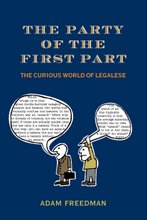Choate
Choate has become a legal term of art, as seen in the "choate lien doctrine." The only problem -- now how can I put this? -- is that choate is an utterly nonsensical word. The word “inchoate” exists, sure: it comes from the Latin incohatus or “incomplete.” In the early 1900's, lawyers, assuming that choate must be the opposite of inchoate, started using "choate" to refer to things that are complete, like a fully perfected lien. But actually, the "in" of inchoate is more like the "in" of inebriated. The Oxford English Dictionary refers to choate as "an erroneous word, framed to mean ‘finished’, ‘complete’, as if the in- of inchoate were the Latin negative." For more on Legal Latin, see my February 03 column.
In the meantime, if you drive, make sure to stay ebriated.



